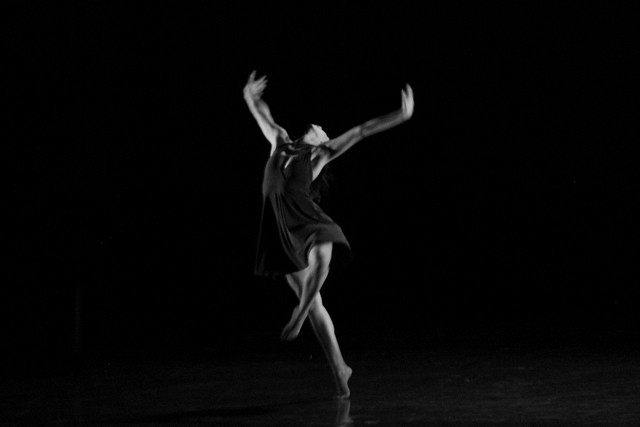!["Dança" by Luci Correia. Licensed under CC Attribution 2.0 Generic. [Changes to photo: filter added]](https://4dancers.org/wp-content/uploads/2015/10/Stage-Fright-pic2-Edit-.jpg)
Stage fright can feel like the ultimate self-betrayal. After all, dancing is what you love most, you’ve put in hours and hours of rehearsals, you’ve carefully warmed up, you’ve reviewed the steps in your head, the big moment has come… And now, you’re caving to fear. However, rest assured—
Your fear is not irrational. Don’t beat yourself up over it.
As Aaron Williamon, professor of performance science at the Royal College of Music, has explained:
“It’s not a natural thing to do, going out and dealing with such high levels of stress in public. And it’s nothing to do with age or inexperience. No matter how highly skilled a person is, the body’s preprogrammed stress responses mean they can enter a different physical state and sometimes even a different psychological state.”
For me, as a regular performer (albeit in the “passionate amateur” category) stage fright is inversely proportional to the size of the performing venue. In a larger theater, where in the audience is mostly consumed in darkness, I experience minimal nervousness. In a smaller theater, where I can see the people sitting in the front rows, nervousness is more of an issue. In a studio performance, where I can see the faces of everyone watching…well, let’s just I say this is where I need the most improvement…
My experience with a frustrating bout of stage fright during a studio performance this past summer inspired me to research the topic more. Beyond the common suggestions of calming techniques and “be prepared”, here are some interesting thoughts and reminders I came across:
The Audience Is Not Hoping to See You Fail
“The audience is not there to see [you] fail. Think about it. Every time you go to a performance or a play or a musical, do you sit in the audience and think, “I hope they fall…I hope she messes up…oh, I really want to see them do badly…”? You don’t!” – Kathryn Morgan, Performance Anxiety & Stage Fright
So true and yet so easy to overlook. Also, when you do see a performer make a mistake in a show, are you filled with delight or scorn? No. You probably feel empathy and as well admiration for their courage to keep going.
The Audience Probably Isn’t There to See You At All
“Remind yourself that they’re not here to see or hear you, unless you’re a very famous person, or your mother’s in the audience.”- Blocked by Performance Anxiety?
This is especially true in school dance shows, recitals, and semi-professional productions. (It’s probably even true in many professional productions) Be honest. In most performances, most people are just there to watch their family members and/or friends perform. So, “dance like no one is watching” because there’s probably quite a bit of truth in that!
It Could Be Helpful to Imagine Worst Case Scenarios
“Try to think of the worst case scenario, and then give yourself advice what to do if it happens: I could forget my steps (OK, I’ll improvise). I could fall off or on the stage (well, in case something like that really does happen, I should only worry about not injuring my legs, not my pride, and after all, it will make a great anecdote some day!). I could fall out of rhythm and completely mess up the whole dance (I’ll catch up with it after just a few seconds, I know I will), etc.”- 3 Tricks To Help Irish Dancers Overcome Stage Fright
This takes “be prepared” to another level. But, if it makes you feel more comfortable to consider different backup plans like this, then why not? If nothing else, the idea that a major error will “make a great anecdote someday” is a good frame of mind to keep things in perspective and take the pressure off yourself. (See Kathryn Morgan’s Performance Mishaps & Funny Moments video for a good laugh.)
You Might Not Be Able to Completely Free Yourself From Stage Fright…
“I am onstage more than fifty years. Sometimes I do shows every night for weeks. Still, it never doesn’t come. Starts four hours before. I don’t even try to fight it anymore. I know it will always be there.” – Mikhail Baryshnikov, I Can’t Go On!
Yes, it’s a rather horrifying thought. But, when all else fails, you might just have to accept that stage fright is an obstacle you will regularly have to ride out. But dancers are used to dealing with obstacles, and, at the end of day, it will be well worth the ride. Remember, you’re in good company if Baryshnikov knows exactly what you’re going through!

Gabriel Saldana. Licensed under CC Attribution-ShareAlike 2.0 Generic. Changes to photo: filter added






